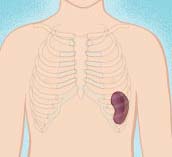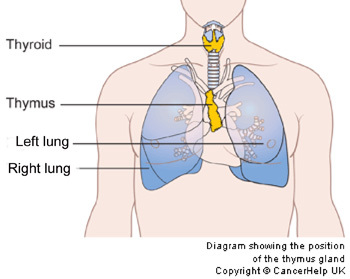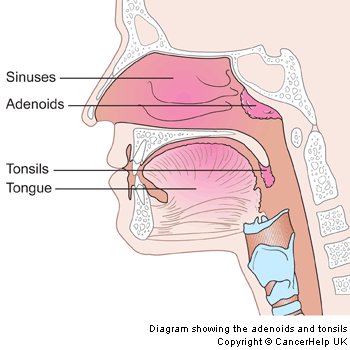The Lymphatic System is made of capillaries, vessels, nodes, lymph and various organs. Here we will talk about the organs. On the page The Lymphatic System you will find details on lymph, capillaries, vessels etc. as well as general information on the Introduction To Lymph Page.
The Spleen:
The spleen is the largest lymphatic organ in our body. It is found on the left side of the body just under the rib cage approximate to the transverse/descending portion of our colon. It actually has very similar characteristics of the nodes except the spleen is filled with blood. It is in the spleen that the blood is filtered and replenished.
 The spleen consists of two types of tissues, red pulp and white pup. The red pulp filters out the worn out and damaged red blood cells and destroys them and replaces them with fresh red blood cells made in the bone marrow. The white pulp contains the B and T cells (lymphocytes) that fight infection, bacteria, germs, viruses, etc.
The spleen consists of two types of tissues, red pulp and white pup. The red pulp filters out the worn out and damaged red blood cells and destroys them and replaces them with fresh red blood cells made in the bone marrow. The white pulp contains the B and T cells (lymphocytes) that fight infection, bacteria, germs, viruses, etc.
The spleen is an extremely delicate organ and damages very easily. It is common to hear of someone losing their spleen in a car accident. We can survive without our spleen but our immune system becomes greatly weakened and our bodies are then highly susceptible to infections.
The Thymus Gland:
I know I am referring to the Thymus under the heading of Lymphatic Organs when it is actually a gland*. The Thymus Gland is a small gland  under our breast bone just above the area of our hearts. It sits between our lungs. It is here that white blood cells are produced. It is mostly active when we are young and shrinks as we age. As we have been discussing it are the white blood cells which include lymphocytes that are responsible to fight infections, viruses, bacteria, cancer cells, germs, soot and anything else that is thrown at us that is threatening our health.
under our breast bone just above the area of our hearts. It sits between our lungs. It is here that white blood cells are produced. It is mostly active when we are young and shrinks as we age. As we have been discussing it are the white blood cells which include lymphocytes that are responsible to fight infections, viruses, bacteria, cancer cells, germs, soot and anything else that is thrown at us that is threatening our health.
Tonsils & Adenoids:
 Referred to as glands also, both the Tonsils and Adenoids are in our mouth and are our first line of defense of substances entering our body. They serve as protectors to the digestive system and lungs from infections, germs, bacteria and viruses.
Referred to as glands also, both the Tonsils and Adenoids are in our mouth and are our first line of defense of substances entering our body. They serve as protectors to the digestive system and lungs from infections, germs, bacteria and viruses.
As we know removing these glands has generally been considered having minimal consequences to our health. As we learn more about the immune system though we are realizing how very important these glands are to our maintaining a sound immune system.
Thanks for visiting….
Together Our Hands Are Joined To Heal One Another
Alexander Gardener The Lymph Guy Lymphatic Massage Specialistthelymphguy@gmail.com
Note: I want to thank Kids Health & Cancer Research UK that provided some of the above diagrams. Though I tried to get permissions I did not get responses and hopefully in the spirit of sharing knowledge and education no one will be offended.
*But since glands are always organs it is allowed. We won’t get into the science of glands and organs here but very simply put glands produce and secrete substances that can be a hormone, an enzyme, or any other secretion. Organs are larger and more complex being made of many different types of tissues and usually work as part of a system like the digestion system. A bit of trivia for you: Our skin is the largest organ of the human body that has more than 2 square meters of area.



